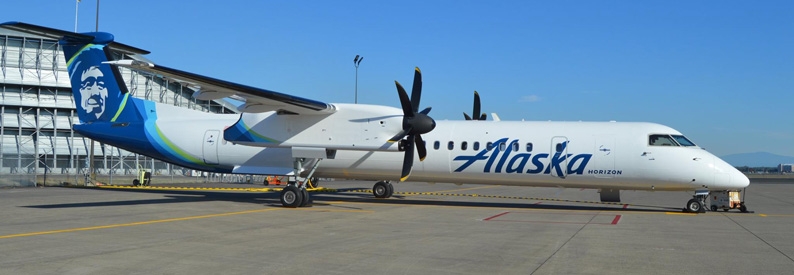Alaska Airlines targets hydrogen-powered Q400s

A new investment by the Alaska Air Group into hydrogen-electric aviation solutions developer ZeroAvia (Hollister) will see the US airline convert its regional aircraft fleet to hydrogen-electric power, starting with its DHC-8-Q400s.
ZeroAvia will set up a location in the Seattle area and engineers of both companies will work together to scale Alaska’s existing powertrain platform to produce the ZA2000, an engine family capable of producing between 2,000 and 5,000 kilowatts of power with a 500-mile (about 800km) range, the companies said in a joint statement.
The partnership will initially deploy ZeroAvia’s hydrogen-electric propulsion technology into a Dash-8-Q400 previously operated by Alaska Air Group subsidiary Horizon Air (QX, Seattle Tacoma Int’l).
ZeroAvia said it would work closely with regulators to ensure the aircraft met both safety and operational requirements.
Alaska has also secured options for up to 50 kits to begin converting its regional aircraft to hydrogen-electric power through ZeroAvia’s zero-emission powertrain, starting with the Dash-8-Q400.
The size of the airline group’s investment in ZeroAvia was not disclosed, but other investors include the Seattle-based Amazon Climate Pledge Fund and Bill Gates’s Breakthrough Energy Ventures, the companies said.
“This pioneering zero-emission aviation rollout will be supported by the ground fuel production and dispensing infrastructure from ZeroAvia and its infrastructure partners, such as Shell. Working to advance novel propulsion is one of the five parts of Alaska’s strategy to achieve net zero by 2040,” said Diana Birkett Rakow, vice president of public affairs and sustainability for Alaska Airlines.
ZeroAvia said it recently successfully ground-tested its 600kW powertrain capable of flying 10-20 seat airframes for 500 miles. It is also well advanced in preparing a 19-seat aircraft for flight testing at Cotswold Airport in the UK and is moving to full-size prototype manufacturing of its 2,000 kW engine for demonstrations in 2022.
